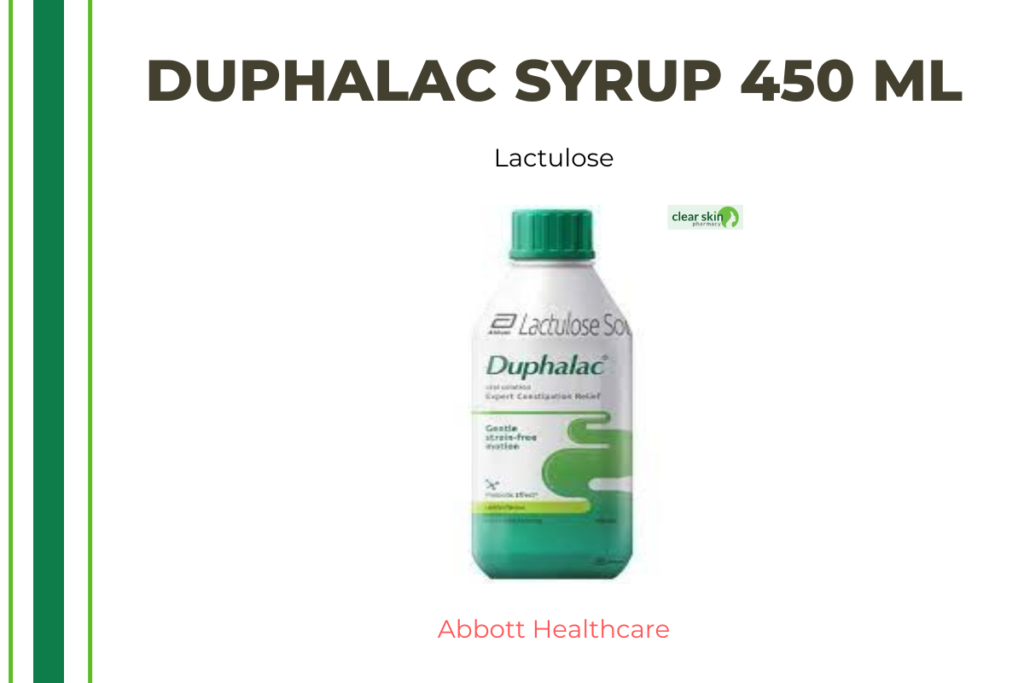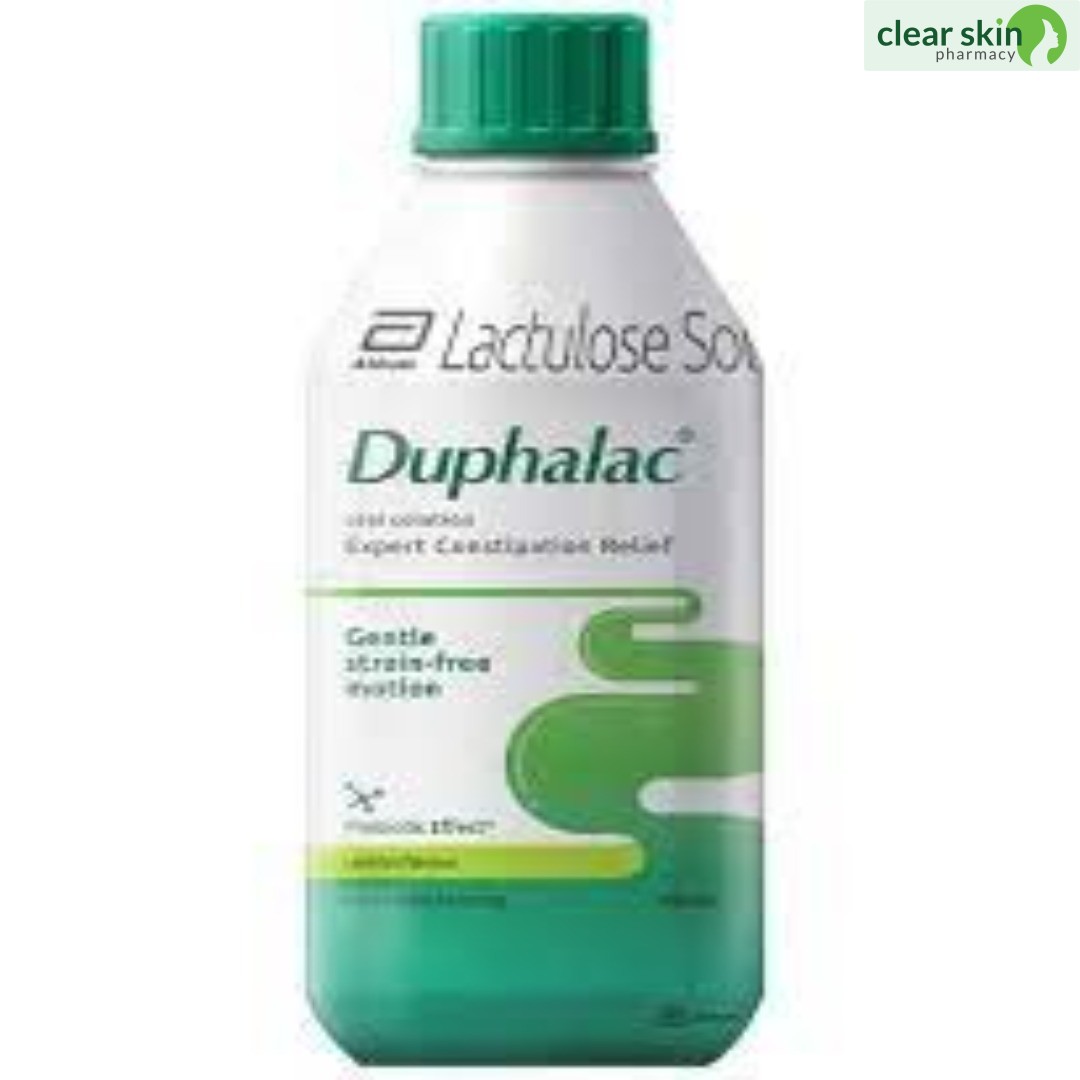Duphalac Syrup
Laxatives are used to treat constipation, and Duphalac Syrup is a laxative. Also treated with Duphalac Syrup is hepatic encephalopathy (decline in brain function that occurs as a result of severe liver disease). Constipation is characterized by dry, unpleasant, and difficult bowel movements that occur infrequently.
Duphalac Syrup is a sugar substitute that breaks down in the colon (intestine) into products that absorb water from the body and into the colon to relieve constipation. This water softens the stool. Additionally, it assists those with liver disease in reducing the amount of ammonia in their blood.
Use Duphalac Syrup with or without food. Duphalac Syrup is a liquid that should be administered orally using the measuring cup included in the packaging. The powder or granules of Duphalac Syrup should be dissolved in water and then swallowed. A medical professional will administer Duphalac Syrup as an enema. Do not medicate yourself.
According to your medical condition, you should take Duphalac Syrup for the prescribed duration. In some instances, common adverse effects such as flatulence (wind), abdominal pain, nausea, and vomiting may occur. The majority of these side effects do not require medical intervention and will subside over time. However, if you experience these side effects frequently, you should consult your physician.
Continue using Duphalac Syrup as directed by your doctor to treat your condition effectively. While using Duphalac Syrup, consume a great deal of water (at least 6-8 glasses). If you keep Duphalac Syrup in your mouth after swallowing, tooth decay may occur. If you take Duphalac Syrup for more than a week, you run the risk of becoming dependent on it for bowel movements. Consult your doctor before using Duphalac Syrup if you are pregnant or breastfeeding; your doctor will only prescribe Duphalac Syrup if the benefits outweigh the risks. Duphalac Syrup should not be administered to children unless prescribed by a child specialist. If you suffer from galactosemia, you should not take Duphalac Syrup (galactose indigestion disorder). Tell your doctor if you have diabetes or need a colonoscopy.
Constipation and liver encephalopathy may be treated with Duphalac Syrup.

Medicinal Advantages
Laxatives are used to treat constipation, and Duphalac Syrup is a laxative. Also treated with Duphalac Syrup is hepatic encephalopathy. Duphalac Syrup alleviates constipation by drawing water into the digestive tract, thereby softening and making feces easier to pass. Duphalac Syrup aids in normalizing bowel movements. Duphalac Syrup is a form of sugar that is broken down in the large intestine into mild acids, thereby drawing water into the colon and softening feces. Additionally, Duphalac Syrup promotes the growth of beneficial gut bacteria that aid in digestion. Duphalac Syrup promotes the efficient absorption of nutrients in the gut, allowing you to get the most out of your food.
Use Instructions
Use Duphalac Syrup with or without food. Liquid: Shake the container well before using the measuring cup included in the package to administer the recommended dose or quantity orally. Consume the powder or granules dissolved in water. A medical professional will administer Enema-Duphalac Syrup. Do not medicate yourself.
Place in a cool, dry area out of direct sunlight.
Duphalac Syrup Side Effects
As with all medications, Duphalac Syrup can cause side effects, though not everyone experiences them. Flatulence (wind), abdominal pain, nausea, and vomiting are the most common adverse effects of Duphalac Syrup. If you experience any of these side effects frequently, please consult a physician.
Drug Recommendations
If you are allergic to any of Lactulose’s ingredients, you should not take it. Antacids should not be taken with lactulose. Maintain a one-hour separation between Lactulose and antacid medications to prevent interference with Lactulose’s effectiveness. Lactulose should only be consumed if prescribed by a physician. Consult your doctor if you do not have a bowel movement or if you experience rectal bleeding after taking Lactulose. If you have galactosemia, don’t take Lactulose (galactose indigestion disorder). Tell your doctor if you have diabetes or need a colonoscopy. Consult your physician before taking Lactulose if you are pregnant or breastfeeding; your physician will only prescribe it if the benefits outweigh the risks. Children should only be given lactulose with a doctor’s prescription. If you take Lactulose for more than a week, you run the risk of developing a dependence on it for bowel movements.
Interactions Between Drugs
Furosemide (used to treat edema), docusate and polyethylene glycol (used to treat constipation), ondansetron (used to prevent nausea and vomiting), as well as other laxative medications, may interact with lactulose.
INTERACTIONS BETWEEN FOOD AND DRUGS: None established or discovered.
lactulose may interact with irritable bowel syndrome, intestinal obstruction disorder, diabetes, and galactosemia (galactose indigestion disorder).
Safety Suggestions
ALCOHOL
Alcohol has no effect on lactulose. However, it is advised that you refrain from drinking alcohol while taking Lactulose.
PREGNANCY
Please consult your physician prior to using Lactulose if you are pregnant; your physician will prescribe Lactulose if the benefits outweigh the risks.
BREAST FEEDING
It does not appear that lactulose enters breast milk. Please consult your physician before using Lactulose if you are breastfeeding; your physician will prescribe Lactulose if the benefits outweigh the risks.
DRIVING
Driving abilities are unaffected by lactulose consumption.
LIVER
If prescribed by a physician, it is safe to use LIVER Lactulose. If you have any concerns about this or if you have a liver condition, please consult a physician.
KIDNEY
If prescribed by a physician, it is safe to consume lactulose. Please consult a physician if you have any concerns about this or if you have kidney impairment.
No habits formed
Advice on Diet and Lifestyle
Maintain a diet that is well-balanced and rich in fresh fruits and vegetables.
Consume a lot of water and other fluids to stay hydrated.
Maintain a healthy lifestyle by regularly engaging in physical activity.
Make sure you get enough rest.
Make an effort to defecate whenever your body instructs you to.
Whole-wheat bread, oats, flaxseed, almonds, beans, lentils, berries, apples, oranges, bananas, pears, and figs are examples of fiber-rich foods, as are the aforementioned fruits and vegetables (broccoli, spinach, sweet potatoes, avocados).
Additional information: This item is non-refundable.
Glossary of Diseases and Conditions
The condition of having infrequent bowel movements is known as constipation. Frequently, stools are dry, unpleasant, and difficult to pass. Constipation is a medical condition in which a person has fewer than three bowel movements per week. On the other hand, bowel habits can vary from person to person. Symptoms include bloating, abdominal pain, and the sensation of an incomplete bowel movement. Constipation occurs when the normal muscle contractions of the large intestine slow down, resulting in incomplete bowel elimination from the body. Constipation can be caused by a sudden change in diet, a low-fiber diet, insufficient fluid intake, and lack of physical activity. Hepatic encephalopathy is a liver disorder in which the liver fails to remove toxins from the body, resulting in deteriorating brain function.
FAQs
Lactulose alleviates constipation by drawing water into the intestine, softening the stool, and making it easier to pass.
Lactulose could take up to 48 hours to take effect.
The treatment for hepatic encephalopathy in adults is lactulose. Hepatic encephalopathy is a liver disorder in which the liver fails to remove toxins from the body, resulting in deteriorating brain function.
If you consume too much Lactulose, you may experience diarrhea. If you have diarrhea, consume copious amounts of water and fiber-rich foods. Consult a physician if you observe blood in your stools (tarry stools) or if you have excessive diarrhea. Do not administer anti-diarrheal medication to yourself.
Do not take Lactulose for longer than one week, as it may cause dependence on the substance for bowel movements. Long-term use of Lactulose may cause dehydration and an imbalance of fluids and salts in the body, which may impair intestinal muscle tone. Consult your physician if you continue to experience irregular bowel movements after five days of using Lactulose.
After the expiration date, Lactulose should not be consumed. Expiration refers to the final day on which the manufacturer guarantees the efficacy of the medication (strength). Regularly check the expiration date and dispose of any medication that has passed its expiration date.







Be the first to review “DUPHALAC SYRUP 450 ML 1 bottle”